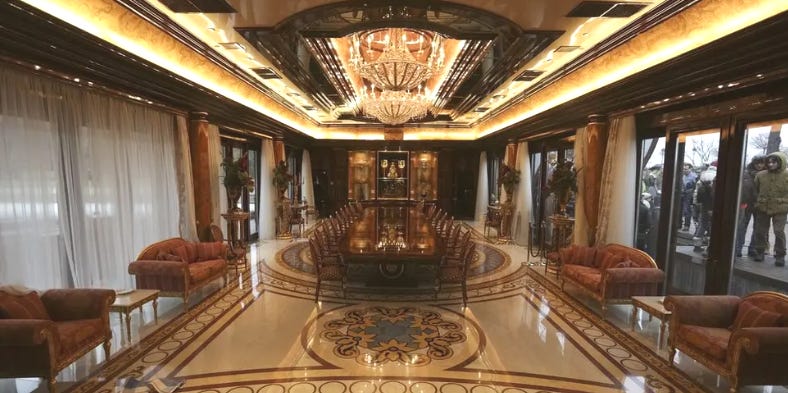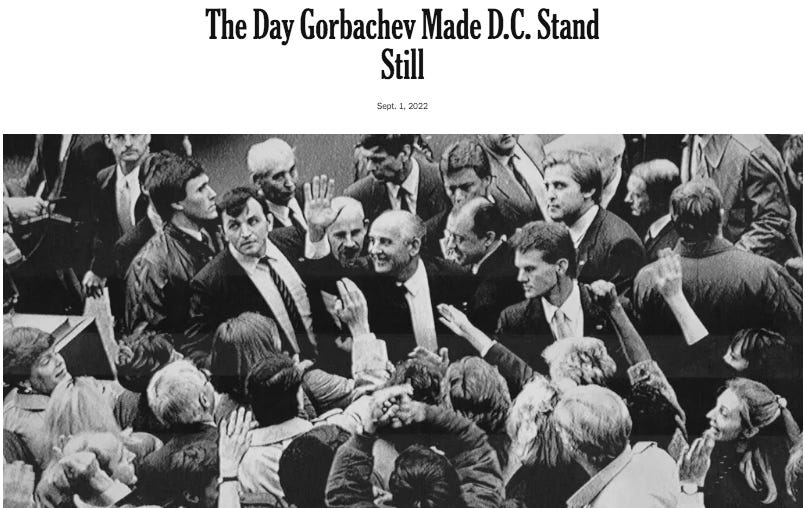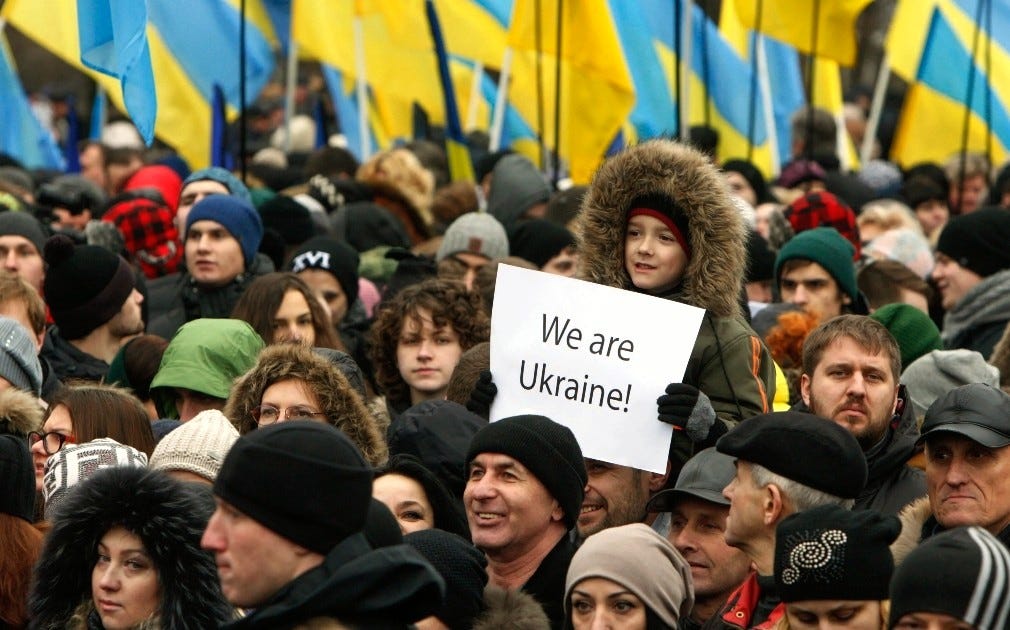The Ukrainian President got a parking ticket. Perfect.
It’s called rule of law, democracy - it's the basis of the European Union. It's what the Ukrainians are fighting for - and what Putin is fighting against.
(‘The Maidan’ - Independence Square - in Kyiv, February 2014)
BY MICHAEL ANDERSEN
Last week, President Zelensky’s delegation parked illegally in Helsinki - and promptly got a ticket. It made me smile; somehow the world had come full circle, because weirdly - or maybe not so weirdly, as we shall see - the cars and motorcades of Soviet and post-Soviet leaders have always been a pretty good indicator of the state of democracy and rule of law in that part of the world. Yes - cars, motorcades.
Zelensky’s parking ticket in Finland, a country in the European Union with a painful history with it Russian neighbor, somehow symbolizes that Ukraine is a part of Europe. If Zelensky pays the ticket, of course.
2014: “Away with the motorcades!”
Nobody who was on ‘the Maidan’ - the Independence Square - in Kyiv that late February night 11 years ago will ever forget it. It was one of the defining moments of Ukraine’s democratic revolution.
Just a few days earlier, the Ukrainian dictator Viktor Yanukovych had ordered his snipers to open fire on the demonstrators - more than 100 people were mowed down and killed.
But - no matter - the protesters stayed on the square, in their tens of thousands and only a couple of days later, Yanukovych gave up in the face of this rare and raw example of people power and fled to Russia, to the protective embrace of his master Vladimir Putin. (Not the first dictator to do so, and hopefully not the last.)
I had been filming and interviewing on the square almost daily during the three months-long demonstrations in that winter of 2013-14, and several times our cameras had caught the giant banner hanging down from a bridge at the back of the square: “Down (or away) with the motorcades” (“Кортежi геть”) - as in the limousines and masses of accompanying luxury cars - always black, with dark windows and full of bodyguards and personal assistants - freighting around corrupt, rich politicians, government officials and oligarchs who had run and Ukraine (in effect stolen the country) since its independence 20 years earlier.
(Screenshot from my film “Ukraine: A dangerous game”, with the “Down with the motorcades!” sign in the background, February 2014)
Other banners on the Maidan asked “Who paid for your Mercedes?” In short, the Ukrainians were shouting: ‘We are done with the same old, same old corrupt people staying in power and privilege forever!’ And millions of people all over the country were taking to the streets.
Soon - during the optimistic Spring of 2014, after the dictator had been kicked out - the many small, independent online media in Ukraine would be full of photos of the opulent, tasteless and stolen houses, flats, diamonds, statues and paintings of the elite. And their foreign luxury cars not least. Not just the president, but his government ministers and high-level officials, judges, regional governors and local mayors. Many of them managed to flee to Russia, the Middle East and some even to Western Europe. To this day, relatively few of them have been prosecuted.
(Dining room in the ousted Ukrainian President’s country estate just outside Kyiv. It came complete with a private lake with life-size galleons and the dictator’s own zoo / photo: BBC)
Late that evening, February 22 2014, news reached the tens of thousands of demonstrators on the square that Yuliya Tymoshenko had been freed. The 53-year-old Tymoshenko had been prime minister and minister for fuel and energy under several presidents. In 2011, she had been imprisoned on clearly politically motivated charges after she had challenged Viktor Yanukovych for the presidency in 2010 and only narrowly lost the election. Thus, the incredibly wealthy woman was a political threat that Yanukovych, in time-tested Soviet manner, got rid of. In October 2011, Yanukovych’s court found Tymoshenko guilty of abuse of power, and sentenced her to seven years in jail, and ordered her to pay the state $188 million.
From the stage on the Maidan – the Independence Square – somebody from Tymoshenko’s political party ‘Fatherland’ (‘Batkivshchyna’) – by far the best-organised, most modern and well-financed party in the country, it is estimated that Tymoshenko spent $150 million on her presidential campaign in 2010 – took the microphone and announced that “Yuliya is free!”
The crowd’s first reaction was applause – Yuliya Tymoshenko had been imprisoned by the dictator, as an enemy of the Yanukovich regime, so she had to be a good one - was the immediate reaction of many.
But then it happened: at first a hesitation, then a sort of hissing, then the boos started. People, mostly the young, were shouting '“Away with the motorcades”, “great that Yuliya is out, but she should go home to her fancy villa and not come here.” A man next to me, a 40-year-old school teacher named Oleg, shouted, “she doesn’t belong here on the Maidan with us,” his wife Maria, 41 and a nurse, added, “Yulia is just another oligarch” and “Enough with the motorcades!”
Soon the square was awash with rumor that Tymoshenko’s motorcade had been stopped by demonstrators on the edge of the city.
USSR and beyond: Motorcades as a symbol of power and corruption
I remember when I lived in Tashkent - Uzbekistan’s capital - 25 years ago. The ruler of that country was one Islam Karimov – a brutal, primitive, vindictive little shite who kept 10,000 political and political prisoners in his horror prisons. (I apologize for my language, but I lost several friends and colleagues to Karimov’s horror regime. I was twice threatened on my life by his goons.)
In cables home to Washington (later leaked), American diplomats in Tashkent regularly described the Karimov regime as one of the most corrupt, brutal and oppressive regimes in the world. But the West needed to stay friendly with Karimov in order to get access to neighboring Afghanistan, so the Bush and Obama governments largely closed their eyes and certainly mouths, and plied the Uzbek dictator with billions of dollars. Karimov and his henchmen were known for enjoying torturing political opponents, some were even boiled to death. In 2005, he ordered his army and police to massacre more than 1,000 peaceful demonstrators. That was the last time anybody dared demonstrate in Uzbekistan.
Karimov would eventually stay in power till 2016 (from 1990, so 26 years in power) when he died of a heart attack while sitting on his toilet made of gold.
Whenever this gruesome man and his limousine motorcade would travel across Tashkent – a sprawling metropolis with 4-5 million inhabitants – life would come to a standstill; streets would be totally cordoned off, all people would be ordered inside, thousands of heavily armed police would be posted along the dictator’s travel route to protect him - despite the fact that Karimov according to state propaganda was ‘the beloved father of the Uzbek nation’ and routinely ‘won’ the ‘elections’ with close to 100% of the votes. (Karimov literally controlled all media, the internet was still in its infancy.)
Once, I was standing in front of my house a few minutes before the president was supposed to be passing; a policeman noticed me and shouted at me to get the hell inside. When I played the stupid foreigner card and asked him politely whether I couldn’t stay out to watch the president’s motorcade whisk by, his answer was to draw his pistol and aim at me till I ran into my house as fast as I could, rather shaken.
Such motorcades were a completely ‘normal’ thing all over the (post)Soviet Union. They became an everyday reminder of who was in the ruler and who was the ruled. They were a symbol of the extreme corruption and inequality in the socialist paradise.
“For 25 years, my father has not set foot on the streets of Moscow, he never went anywhere without his limousine”, the daughter of Andrei Gromyko said about her own father. For 28 years, Gromyko was the Soviet Union’s foreign minister, till Mikhail Gorbachev came to power in 19085 and immediately fired him.
One of the reasons why so many of the crooks in the Soviet leadership detested Gorbachev was that he immediately, upon coming to power, started canceling their enormous privileges.
In fact, Gorbachev became famous for often stopping his own motorcade when it was blasting through Moscow, to go out and talk to the Russians in the streets. It was shocking, both to the ‘average Russian’ as well as to Gorbachev’s colleagues in the Soviet leadership. Of course, the media-savvy Gorba did the same when he came to Washington in 1987 (photo by The New York Times).
2014-2022: An unfinished revolution
Yuliya Tymoshenko was likely not guilty of the things that Yanukovich officially imprisoned her for, but she was very far from a clean or honest politician. During the time she was in government, her family became incredibly wealthy, and it was well-known in Ukraine and among foreign diplomats that Tymoshenko and her husband were making a lot of dirty money on Ukraine’s gas deals with Russia - deals she was in charge of negotiating.
Tymoshenko had, however, become a bit of a cause célèbre with some western politicians. Mainly because of the lack of more attractive alternatives, no doubt also because she was beautiful, said the right things and had spent millions hiring Bruxelles and London-based public relations companies to promote her in Europe.
In the end, Yuliya Tymoshenko did make it to the stage on the Maidan in Kyiv. But in a much reduced version of herself - both physically and politically - frail, carried onto the stage in a wheelchair, she tried to make herself politically relevant again by ingratiating herself with the demonstrators. But her time had past. Ukrainians were tired of motorcades, they wanted to go to Europe, they wanted to live in a civilized manner, they wanted rule of law.
However, it would take several years before the younger generation that drove the demonstrations in the winter of 2013-14 would gain political influence, for example in parliament and government. Some, including myself, would argue that they still have some distance to travel. It takes time to finish a revolution. But, contrary to the old and the middle-aged, the younger Ukrainians have no doubt about the direction they want to see their country move in: Europe, rule of law, “down with the motorcades!”
A few months later, in June 2014, Tymoshenko would run for president of Ukraine; with her money and well-oiled party machine, she did well, coming second only to Petro Poroshenko, another surviving oligarch. Like Tymoshenko, Poroshenko also had close relations to the previous regimes and dictators; in fact, Poroshenko, a billionaire, was the one who in 2001 had financed The Party of Regions that had helped Viktor Yanukovych take power. In 2012, he had been rewarded with the post of economy and trade minister under President Yanukovych.
2025: The beauty of a parking ticket in Helsinki
Jumping 11 years ahead: Helsinki, Finland, March 19, 2025 - a Ukrainian delegation, led by the country’s president Volodymyr Zelensky, is visiting.
Because of its own painful history with Russia, the Finns - and not least their president Alexander Stubb - are among the most ardent supporters of Ukraine. Finland supports Ukraine with one percent of its GDP, placing it fifth on the list of donors, after the three Baltic countries and Denmark.
While Zelenky was speaking at the University of Helsinki, the police planted a ticket on the windshield of one of the cars belonging to his delegation. For the simple reason that the car was parked illegally.
‘Why not?’ was the reaction of most Finns.
‘Why shouldn’t President Zelensky get a parking ticket if his car was parked illegally? Nobody is above the law.”
I’m sure it’s an unfair comparison - but so, come to think of it, is invading your neighboring country - but it should be mentioned that Russian diplomats in the U.S. have a long-standing tradition of totally disregarding local parking regulations and not paying the ensuing parking tickets. In 2011, NPR reported that Russian diplomats had 892 outstanding tickets in Washington D.C. In 2022, Russia owed New York $101,000 in parking fines.
I suggest that you read Frank Martela’s piece about the Finnish side of Zelensky’s parking ticket – and why the Finns are one of the most content people in the world (with the other Nordic countries). It really is quite simple: it turns out that having a say in how your country is run makes you more happy. Who would have thought?
And that is exactly what connects Finland with Ukraine 11 years ago, and today: In 2013-14, millionss of Ukrainians took to the streets because they had had enough of corruption and misrule of their country. They had had enough of the ‘motorcades’ of their corrupt leader who existed in a parallel universe, above the law. The Ukrainians wanted - demanded - democracy, they wanted the crooks out and they wanted to belong to Europe. Concretely the European Union. That much was clear from the thousands of banners and posters and chants. Like, for example, Finland.
(2013, students in Kyiv demonstrating for their country to belong to Europe, “To live instead of obeying Putin”)
It is also clear that that was the reason why Putin invaded Ukraine in 2014; not because he had ambitions to recreate the Soviet Union, but because of his need to defend his Soviet, corrupt way of living and amassing wealth.
People all over the world had been following the Ukrainian demonstration and revolution during the winter of 2013-14. Russians had also been watching. Putin and his corrupt lot could, of course, not allow that kind of thing to develop at home. And the best way to avoid that was to crack down on it - in Ukraine.
Putin did this first by bribing/threatening the Ukrainian President Yanukovych to turn down the gracious (and surprisingly clever and innovative) offer from the European Union of granting Ukraine an association agreement that would have made it much easier for Ukrainians to work and educate themselves in EU countries, and would have tied the Ukrainian economy closer to Europe’s.
It was exactly Yanukovych’ no! (on their behalf) to the EU offer that first made the Ukrainians take to the street, in November 2013. I was there from the very first night, and I have described that night and the following months in detail in a piece called “The most beautiful thing I ever saw.”
Then, in February 2014, when the Ukrainians overwhelmed the Ukrainian dictator, Putin resorted to invading their country and doing all he could to manipulate and foment internal strife between Ukrainians. But it still didn’t stop the Ukrainians wanting democracy, rule of law, civilization and Europe.
Thus, Putin’s full-scale invasion in February 2022 was simply – from his point of view – the logical next step. Not to rebuild the USSR. But to protect his corrupt way of thinking, living, ruling.
Because Vladimir Putin does not want to get a parking ticket.













What a remarkable mini-memoir, fascinating and informative. You've added depth and detail to our understanding of recent Ukrainian history and the movement toward Europe. Thank you!
Have you two considered writing a joint memoir and having it published in book format? It would make fascinating reading and do much to raise the understanding and appreciation of Ukraine's battle to totally regain its freedom and strengthen its civil liberties and basic human rights.
I really enjoy the depth of knowledge and thoroughness of your essays. I am not especially ignorant, but I find myself much better informed after reading you work. Thank you.